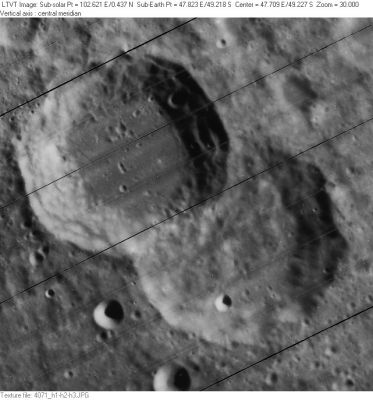Difference between revisions of "Watt"
| Line 6: | Line 6: | ||
|} | |} | ||
<div id="toc"> | <div id="toc"> | ||
| − | [http://www.lpod.org/coppermine/displayimage.php?pid=2621&fullsize=1 [[Image: | + | [http://www.lpod.org/coppermine/displayimage.php?pid=2621&fullsize=1 [[Image:Normal_Steinheil-Watt_LO-IV-071H_LTVT.JPG|external image normal_Steinheil-Watt_LO-IV-071H_LTVT.JPG]]]<br /> ''[http://lpod.org/coppermine/displayimage.php?pos=-2621 LO-IV-071H]'' '''Watt''' is the crater in the lower right, overlain by the similarly-sized [[Steinheil|Steinheil]] (to its northwest). The sharp-shadowed 6-km circle of '''Watt B''' can be seen on the south floor of '''Watt''', with 10-km '''Watt A''' and 12-km '''Watt B''' beyond it (outside the rim). In the upper left corner of this view are 17-km '''[[Steinheil|Steinheil]] X''' and 16-km '''[[Steinheil|Steinheil]] Y''' (only partially visible).<br /> <br /> |
==Images== | ==Images== | ||
[http://www.lpod.org/coppermine/thumbnails.php?album=search&type=full&search=Watt LPOD Photo Gallery] [http://www.lpi.usra.edu/resources/lunar_orbiter/bin/srch_nam.shtml?Watt%7C0 Lunar Orbiter Images] [http://www.lpi.usra.edu/resources/apollo/search/feature/?feature=Watt Apollo Images]<br /> <br /> | [http://www.lpod.org/coppermine/thumbnails.php?album=search&type=full&search=Watt LPOD Photo Gallery] [http://www.lpi.usra.edu/resources/lunar_orbiter/bin/srch_nam.shtml?Watt%7C0 Lunar Orbiter Images] [http://www.lpi.usra.edu/resources/apollo/search/feature/?feature=Watt Apollo Images]<br /> <br /> | ||
| Line 16: | Line 16: | ||
[http://en.wikipedia.org/wiki/Watt_(crater) Watt]<br /> <br /> | [http://en.wikipedia.org/wiki/Watt_(crater) Watt]<br /> <br /> | ||
==Additional Information== | ==Additional Information== | ||
| − | Depth data from [[Kurt%20Fisher% | + | Depth data from [[Kurt%20Fisher%20Crater%20Depths|Kurt Fisher database]]<br /> |
* Westfall, 2000: 3.45 km | * Westfall, 2000: 3.45 km | ||
* Viscardy, 1985: 3 km | * Viscardy, 1985: 3 km | ||
Latest revision as of 03:21, 16 April 2018
Contents
Watt (of the pair Steinheil / Watt)
|
Lat: 49.5°S, Long: 48.6°E, Diam: 66 km, Depth: 3.45 km, Rükl: 76 |
LO-IV-071H Watt is the crater in the lower right, overlain by the similarly-sized Steinheil (to its northwest). The sharp-shadowed 6-km circle of Watt B can be seen on the south floor of Watt, with 10-km Watt A and 12-km Watt B beyond it (outside the rim). In the upper left corner of this view are 17-km Steinheil X and 16-km Steinheil Y (only partially visible).
Images
LPOD Photo Gallery Lunar Orbiter Images Apollo Images
Maps
(LAC zone 128A2) USGS Digital Atlas PDF
Description
Description: Wikipedia
Additional Information
Depth data from Kurt Fisher database
- Westfall, 2000: 3.45 km
- Viscardy, 1985: 3 km
- Cherrington, 1969: 1.98 km
Nomenclature
James Watt (January 19, 1736 – August 19, 1819) was a Scottish inventor and engineer whose improvements to the steam engine were fundamental to the changes wrought by the Industrial Revolution. Watt continued to invent other things before and during his semi-retirement. He invented a new method of measuring distances by telescope.
- Whitaker (p. 200) notes that the combination of Steinheil and Watt was labeled Zamosci on van Langren's 1645 map. Whitaker does not explain where the name Steinheil came from, but evidently in Elger's day the entire structure was known by that name. The name Watt, for the eastern part, was apparently introduced by Schmidt (Whitaker, p. 224). - Jim Mosher
LPOD Articles
Bibliography
